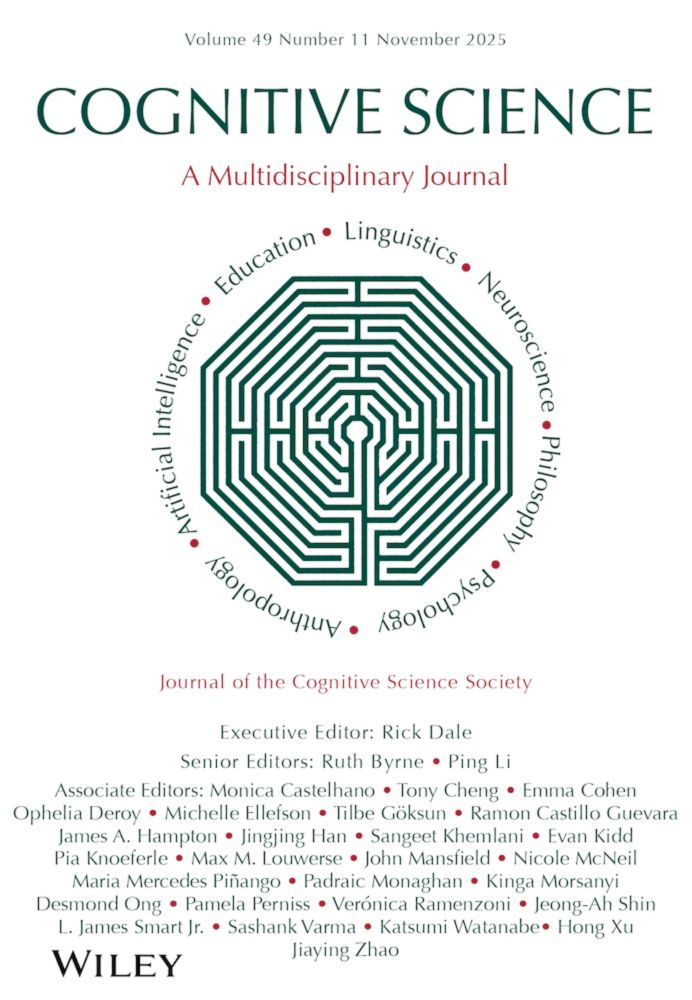New paper on #disinformation. The title is the thesis. Think of disinformation as content that functions to optimise the decisions of the audience for the disinformant. This doesn't require deception or content that induces false belief.
philpapers.org/rec/LITDIF

New paper on #disinformation. The title is the thesis. Think of disinformation as content that functions to optimise the decisions of the audience for the disinformant. This doesn't require deception or content that induces false belief.
philpapers.org/rec/LITDIF
Very cool study for its main result and its null one: consistent with nearly every other comparative study of music, monkeys don't differentiate beats by their relative strength—which even young children do innately. Monkeys have rhythm but not meter!

Very cool study for its main result and its null one: consistent with nearly every other comparative study of music, monkeys don't differentiate beats by their relative strength—which even young children do innately. Monkeys have rhythm but not meter!
🧠 Neurosymbolic Diffusion Models: Thursday's poster session.
Going to NeurIPS? @edoardo-ponti.bsky.social and @nolovedeeplearning.bsky.social will present the paper in San Diego Thu 13:00
arxiv.org/abs/2505.13138

🧠 Neurosymbolic Diffusion Models: Thursday's poster session.
Going to NeurIPS? @edoardo-ponti.bsky.social and @nolovedeeplearning.bsky.social will present the paper in San Diego Thu 13:00
arxiv.org/abs/2505.13138
📢New paper from: Sara Bögels (sarabogels.bsky.social), Tianyi Li, Marlou Rasenberg, Lotte Eijk, Ivan Toni, & Wim Pouw (wimpouw.bsky.social)
www.sciencedirect.com/science/arti...
📢New paper from: Sara Bögels (sarabogels.bsky.social), Tianyi Li, Marlou Rasenberg, Lotte Eijk, Ivan Toni, & Wim Pouw (wimpouw.bsky.social)
www.sciencedirect.com/science/arti...
"Assessing Others’ Knowledge Through Their Speech Disfluencies and Gestures"
Cognitive Science - Wiley Online Library onlinelibrary.wiley.com/doi/10.1111/...
@kudilvebilis.bsky.social

"Assessing Others’ Knowledge Through Their Speech Disfluencies and Gestures"
Cognitive Science - Wiley Online Library onlinelibrary.wiley.com/doi/10.1111/...
@kudilvebilis.bsky.social
www.nature.com/articles/s41...

www.nature.com/articles/s41...
w/ @neuranna.bsky.social @evfedorenko.bsky.social @nancykanwisher.bsky.social
arxiv.org/abs/2511.19757
1/n🧵👇

w/ @neuranna.bsky.social @evfedorenko.bsky.social @nancykanwisher.bsky.social
arxiv.org/abs/2511.19757
1/n🧵👇
osf.io/preprints/ps...
People transitioning to Bayes often wonder how to decide if an effect is meaningful or not. Here you go... 1/🧵

osf.io/preprints/ps...
People transitioning to Bayes often wonder how to decide if an effect is meaningful or not. Here you go... 1/🧵

doi.org/10.31234/osf...
doi.org/10.31234/osf...
We want somebody working on and teaching computational modelling of cognitive processes and/or social processes. Students are amazing, work/life balance very satisfactory, and colleagues are nice!
international.au.dk/about/profil...

We want somebody working on and teaching computational modelling of cognitive processes and/or social processes. Students are amazing, work/life balance very satisfactory, and colleagues are nice!
international.au.dk/about/profil...
Led by the inimitable Zekun Sun
This was my lab's first foray into event cognition
gift link: sciencedirect.com/science/arti...

Led by the inimitable Zekun Sun
This was my lab's first foray into event cognition
gift link: sciencedirect.com/science/arti...


Is the same person treated differently when their race is perceived differently?
Specifically, we study: is the same driver likelier to be searched by police when they are perceived as Hispanic rather than white?
1/

Is the same person treated differently when their race is perceived differently?
Specifically, we study: is the same driver likelier to be searched by police when they are perceived as Hispanic rather than white?
1/
arxiv.org/pdf/2410.03972
It started from a question I kept running into:
When do RNNs trained on the same task converge/diverge in their solutions?
🧵⬇️

arxiv.org/pdf/2410.03972
It started from a question I kept running into:
When do RNNs trained on the same task converge/diverge in their solutions?
🧵⬇️
www.biorxiv.org/content/10.1...

www.biorxiv.org/content/10.1...

🐟Olmo 3 32B Base, the best fully-open base model to-date, near Qwen 2.5 & Gemma 3 on diverse evals
🐠Olmo 3 32B Think, first fully-open reasoning model approaching Qwen 3 levels
🐡12 training datasets corresp to different staged training


🐟Olmo 3 32B Base, the best fully-open base model to-date, near Qwen 2.5 & Gemma 3 on diverse evals
🐠Olmo 3 32B Think, first fully-open reasoning model approaching Qwen 3 levels
🐡12 training datasets corresp to different staged training

"annotators strongly took the LLM suggestions, significantly changing the label distribution compared to the baseline. We show that when these labels created with LLM assistance are used to evaluate LLM performance, reported model performance significantly increases"

"annotators strongly took the LLM suggestions, significantly changing the label distribution compared to the baseline. We show that when these labels created with LLM assistance are used to evaluate LLM performance, reported model performance significantly increases"

w/ @fepdelia.bsky.social, @hopekean.bsky.social, @lampinen.bsky.social, and @evfedorenko.bsky.social
Link: www.pnas.org/doi/10.1073/... (1/6)
w/ @fepdelia.bsky.social, @hopekean.bsky.social, @lampinen.bsky.social, and @evfedorenko.bsky.social
Link: www.pnas.org/doi/10.1073/... (1/6)

